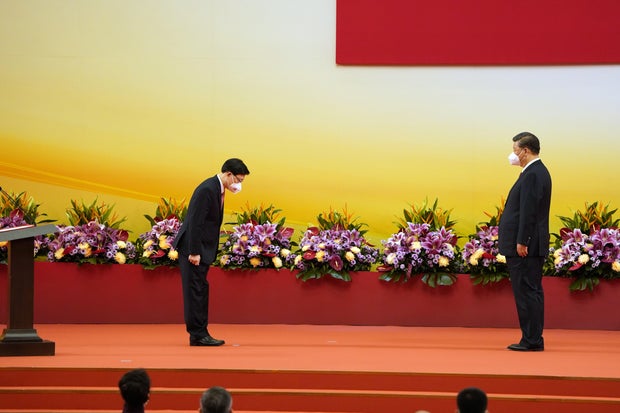Xi Jinping celebrates Hong Kong's anniversary
Hong Kong— Chinese leader Xi Jinping The anniversary of Hong Kong's return in a 25th anniversary speech highlights Beijing's comprehensive control over the former British colony under the vision of a "one country, two systems" framework. The political and civil liberties promised in the century have almost disappeared under Chinese rule.
Xi praised the city for overcoming "violent social unrest." This follows a major communist movement in 2019, followed by a Beijing-led crackdown that wiped out dissent, closed independent media, and coordinated Hong Kong. With tighter control under China's ruling Communist Party, Hong Kong will be closer.
Xi warned that foreign interference and traitors would not be allowed to interfere with Hong Kong's problems. He said "protecting national sovereignty, security and development interests" is a top priority.

"No one in any country or region of the world allows foreigners or even traitors to seize power. "." He added that long-term stability can only be ensured by having a patriot who governs Hong Kong.
Beijing claims "comprehensive jurisdiction"
He has been in Hong Kong's own law for 50 years since 1997. Said the framework that promised the government. The return from the UK was still an excellent system that "must be maintained for a long time".
But he also has "comprehensive jurisdiction" over Hong Kong, where Beijing has a capitalist system and some degree of autonomy in areas like Hong Kong and neighboring Macau. ..
"After returning to our homeland, Hong Kong has overcome all kinds of challenges and has made steady progress," said Xi. "Whether it was the international financial crisis, thecoronavirus pandemic, or the intense social unrest, there was nothing to stop Hong Kong's progress."
Since the protest in 2019, authorities have usedto arrest a number of activists, media and democracy supporters. They introduced a more "patriotic" curriculum in schools and amended election law to keep opposition politicians who are considered non-patriotic away from the city council. With this change, there are few dissenting opinions and many people are leaving the city.
In that view, the Chinese Communist Party has restored the stability of the city destroyed by demonstrations, which is considered a direct challenge to its dominance. For Western democracy, Xi undermined the freedom and lifestyle that made it a global financial and trade hub, distinguishing cities from mainland China.
The United States states that China "damages fundamental freedoms"
Adrian Watson, a spokeswoman for the US National Security Council, said in a statement. The dismantling of Hong Kong's democratic system and pressure on the judiciary, the management of tightening academic and press freedom, and the dissolution of civil society groups and the press "weaken the fundamental freedoms to maintain global stability. rice field".
She said China's policies towards Hong Kong, including the enforcement of the National Security Act, "shocked the institutions, rules and systems that were the basis of international trust in Hong Kong."
"We call on China to act in accordance with the international obligations that China has taken willingly," Watson said.
Xi's two-day trip to Hong Kong is the first trip outside mainland China since the pandemic broke out in January 2020. He last visited Hong Kong in 2017 to celebrate his takeover.
Hong Kong security has been strengthened for his arrival in designated security and no-fly zones. Thousands of guests had to be tested for coronavirus daily and were ordered to check in at a quarantine hotel before attending an event with Xi on Thursday and Friday.
Xi also held an oath ceremony for Hong Kong's new leader, John Lee, a former security official who oversaw the crackdown on the opposition. Lee upheld the city's mini-constitution and promised to pledge allegiance to Hong Kong. He also promised to be accountable to Beijing's central government.
likely to "reflect" the mainland
"The next five years will be an important time for Hong Kong to move from rule to prosperity." Said Lee.
He had previously shown plans to enact Article 23 in the City's Basic Law. It concerns local legislation to protect the Chinese government from acts that threaten national security, such as rebellion, separatism, incitement, destruction, and foreign collusion.
After a major protest in 2003, a similar initiative had to be abandoned. China. "
" A very broad definition of such a law is a fact that promotes arbitrary enforcement and brings more uncertainty and fear to the people of Hong Kong, "Watchdog said. Irwin van der Borgt, Director of the Asia Pacific Region, said: statement.
The morning flag-raising ceremony was attended by Lee, his predecessor Carrie Lam, and other officials except Xi, with Chinese and Hong Kong flag-raising police officers Kim. We marched to the Golden Bauhinia Square. A Chinese-style "goose step" that replaces the English-style march. Guests drew attention while the Chinese national anthem was being performed.
- In:
- Hong Kong
- Xi Jinping
- China
- Communist Party
Thank you for reading CBS NEWS.
Create a free account or log in to
to take advantage of other features.


